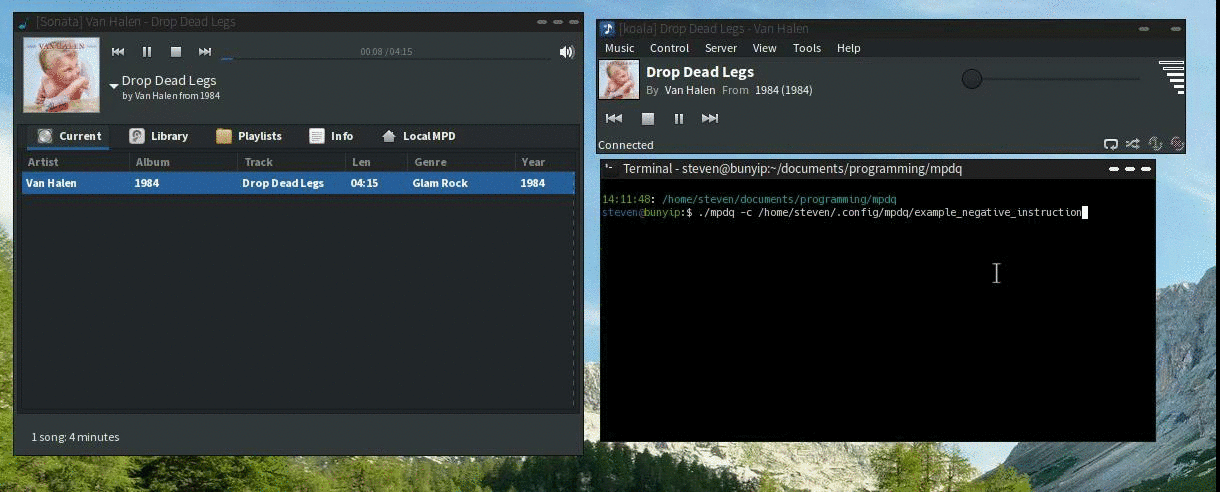mpdq
Automatic MPD playlist or party mode creator to provide weighted randomness while autoqueuing MPD without relying on external services.
Contents
1. About
mpdq is a auto-queing system for MPD to create a flexible and configurable
"party mode" effect with randomization and (re)discovery of your own music.
Inspired by the eclectic soundtracks of Letterkenny, High Fidelity,
Doom Patrol, and many more.
(In-depth explanation at my blog).
mpdq will autoqueue random tracks from your existing music library,
with per-genre weighting and simple defaults.
Because it uses mpd's own data,
new tracks and changes to your music library
will be incorporated when mpd is updated.
If you are looking for the older, heaver, and BPM-using version of mpdq,
those files are in the bpm_version directory of this repository.
2. License
This project is licensed under the MIT License. For the full license, see LICENSE.
3. Prerequisites
These are probably already installed or are easily available from your distro on linux-like distros:
ONE or MORE of the following for artist and song information on your $PATH:
mpdq will attempt to use them automatically in the order listed.
4. Installation
Place mpdq.ini in $XDG_CONFIG_HOME/mpdq
This file (example provided) contains only the following lines:
musicdir=/directory/to/music
mpdserver=hostname.of.mpd
mpdport=6600
mpdpass=mpd_password
queuesize=10
hours=8
songhours=24
mode=simple
songlength=15
artisttime=30
musicinfo=ffprobe
songlength puts a cap on the duration of any chosen song to that many minutes.
artisttime is the minimum time between tracks from the same artist.
musicinfo denotes the helper program that gets additional music information (like
duration) from the MP3. If not specified, mpdq searches along $PATH for (in this
order) ffprobe, exifinfo, and mp3info. If your helper program is in your $PATH,
you can just put the binary name, otherwise put the full path to the program.
** IF YOU USE ANY HELPER PROGRAM BESIDES THESE THREE, YOU WILL HAVE TO EDIT THE PROGRAM **
hours, songhours, and mode manage the size of queue that mpdq maintains,
and how many hours after playing a song that mpdq will not play it again.
See below under Setup for the difference in "modes". Defaults are:
$HOME/Music
localhost
6600
(no password)
10
8
8
simple
15
30
ffprobe
5. Setup
The behavior of mpdq is governed by simple instruction files, as many (or
few) as you desire. The location of the instruction file does not matter, and
must be specified on the command line. Without an instruction file, mpdq will
just shuffle through your entire library with an equal weight to each genre.
Each instruction file is a series of lines in the format genre=weight like so:
Default=1
Rock=3
Classical=0
Rather than go through all the genres and subgenres of your music library and
explicitly defining each one, the Default line assigns a weight to all genres
not otherwise explictly named. Genres with higher number values will show up
more often. In the example above, all genres have a weight of "1" except for
Rock and Classical. Rock will show up more often, while Classical will not
appear at all with a value of "0".
This allows for both very eclectic selections (as with the example above) or very focused selections, such as with the example below:
Default=0
Industrial=1
Gothic=1
Capitalization Matters Here
Order Matters Here
While you can leave a genre out and have it assigned the "default" value, putting them out of alphabetical order will cause problems.
mpdq can also create an example instruction file with all genres listed so
that you can check your genre names properly. It won't hurt to have all the
genres listed, but it is totally unneeded.
The instruction file should end in a newline. If it does not, mpdq will add
one automatically.
If the instruction "default.cfg" exists in the configuration directory, it will automatically be used. If that file does not exist, the default value ("1") will be applied to all genres.
Mode
There are three possible weighting modes for mpdq:
- simple - the default weighting. It only factors in whatever genre weight you defined in the instruction file.
- songs - this weighting factors in the number of songs you have in each genre as well as the genre weight you defined in the instruction file. This will result in increased representation from genres you have more songs in.
- genre - this weighting uses the genre weight as the maximum number of songs
in that genre to be played per the time period you set with
hourin the ini file. So if you putPop=1, you will only hear 1 song from that genre per hour. If all genres are (somehow) exhausted in one hour, it will just use the randomly selected genre.
If you do not have mode defined, it defaults to simple.
songhour maintains a list of previously used songs for that period of time
(in hours). If a song has been played in that time period, it will not be played
again during that time period. It is independent of the hour variable.
6. Usage
mpdq [-d #][-c /path/to/file][-khe]
mpdq has the following command line switches:
- -c : Which instruction file to use
- -d : Override the default priority in the instruction file
- -k : Kill a currently running
mpdqprocess. - -e : Create an example instruction file at $XDG_STATE_HOME/mpdq/example_instruction.
- -h : Show a short help message.
- --loud: Give more feedback to terminal (yes, this means the default is quiet mode)
mpdq will automatically pause if MPD is not set to:
- random: off
- repeat: off
- consume: on
So if you want to have "default" behavior back from MPD without interference
from mpdq, but want to leave the process running, just toggle any of those
values for MPD.
mpdq is meant to be run in the background. Because you define the hostname,
it does not have to be on the same machine running MPD.
mpdq logs what songs it has played, and will not repeat the same song during
the time specified in mpdq.ini.
systemd unit
If you wish to use mpdq as a systemd unit, this template works for me (obviously
change the home directory and user as appropriate, named mpdq.service:
[Unit]
Description=Start mpdq service
After=mpd.service
[Service]
Type=oneshot
RemainAfterExit=yes
User=steven
Group=steven
ExecStart=/home/steven/apps/mpdq/mpdq -c /home/steven/.config/mpdq/example_instruction_file
ExecStop=/home/steven/apps/mpdq/mpdq -k
WorkingDirectory=/home/steven
[Install]
WantedBy=multi-user.target
Adjusting to changes
If mpdq is running for any length of time, there will be library changes. I
realized this after adding a bunch of standup albums with the new genre "Standup"
and suddenly had Steven Wright talking after "Love Will Tear Us Apart". To
fix this possible problem, you first have to set Default=0 in the
instruction file loaded by systemd. Then you have to have mpdq get restarted
whenever the MPD database changes. You can either use monit or fswatch to
make this happen.
Reloading using monit
If you have mpdq set up as a systemd unit, reloading it if there's a change
to the MPD database is pretty easy with this configuration (again, changing
path names as appropriate:
(The "every 2 cycles" is because of the delay as mpdq starts up.)
check process mpdq with pidfile /tmp/mpdq.pid
every 2 cycles
start program "/bin/systemctl start mpdq.service"
stop program "/bin/systemctl stop mpdq.service"
depends on mpd_db
check file mpd_db with path /home/steven/.mpd/tag_cache
if changed timestamp then restart
using fswatch
If you would rather use the fswatch
utility to achive the same end, have cron call this script at a regular interval:
/usr/local/bin/fswatch /home/steven/.mpd/tag_cache | sudo /bin/systemctl stop mpdq.service && sudo /bin/systemctl start mpdq.service
7. TODO
- Fix unalphabetical instruction files in regular flow (using
sort) - reinstate bpm option
- switch instruction file without ending process (perhaps part of the idle loop?)
- lyrics/explicit checker


